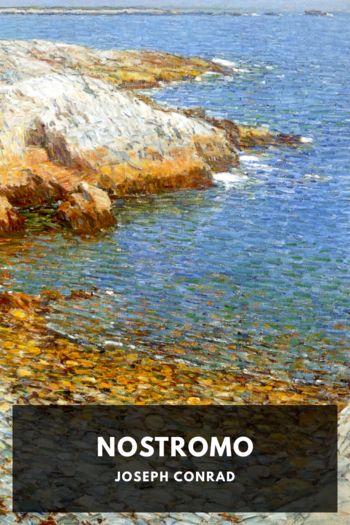Nostromo - Joseph Conrad (books to read fiction .TXT) 📗

- Author: Joseph Conrad
Book online «Nostromo - Joseph Conrad (books to read fiction .TXT) 📗». Author Joseph Conrad
He packed up his modest trunk with speed, with fury, with enthusiasm, and saw it carried out past the old porter at the gate of the Casa Gould with delight, with intoxication; then, as the hour approached, sitting alone in the great landau behind the white mules, a little sideways, his drawn-in face positively venomous with the effort of self-control, and holding a pair of new gloves in his left hand, he drove to the harbour.
His heart dilated within him so, when he saw the Goulds on the deck of the Hermes, that his greetings were reduced to a casual mutter. Driving back to town, all three were silent. And in the patio the doctor, in a more natural manner, said—
“I’ll leave you now to yourselves. I’ll call tomorrow if I may?”
“Come to lunch, dear Dr. Monygham, and come early,” said Mrs. Gould, in her travelling dress and her veil down, turning to look at him at the foot of the stairs; while at the top of the flight the Madonna, in blue robes and the Child on her arm, seemed to welcome her with an aspect of pitying tenderness.
“Don’t expect to find me at home,” Charles Gould warned him. “I’ll be off early to the mine.”
After lunch, Dona Emilia and the señor doctor came slowly through the inner gateway of the patio. The large gardens of the Casa Gould, surrounded by high walls, and the red-tile slopes of neighbouring roofs, lay open before them, with masses of shade under the trees and level surfaces of sunlight upon the lawns. A triple row of old orange trees surrounded the whole. Barefooted, brown gardeners, in snowy white shirts and wide calzoneras, dotted the grounds, squatting over flowerbeds, passing between the trees, dragging slender India-rubber tubes across the gravel of the paths; and the fine jets of water crossed each other in graceful curves, sparkling in the sunshine with a slight pattering noise upon the bushes, and an effect of showered diamonds upon the grass.
Dona Emilia, holding up the train of a clear dress, walked by the side of Dr. Monygham, in a longish black coat and severe black bow on an immaculate shirtfront. Under a shady clump of trees, where stood scattered little tables and wicker easy-chairs, Mrs. Gould sat down in a low and ample seat.
“Don’t go yet,” she said to Dr. Monygham, who was unable to tear himself away from the spot. His chin nestling within the points of his collar, he devoured her stealthily with his eyes, which, luckily, were round and hard like clouded marbles, and incapable of disclosing his sentiments. His pitying emotion at the marks of time upon the face of that woman, the air of frailty and weary fatigue that had settled upon the eyes and temples of the “Never-tired Señora” (as Don Pepe years ago used to call her with admiration), touched him almost to tears. “Don’t go yet. Today is all my own,” Mrs. Gould urged, gently. “We are not back yet officially. No one will come. It’s only tomorrow that the windows of the Casa Gould are to be lit up for a reception.”
The doctor dropped into a chair.
“Giving a tertulia?” he said, with a detached air.
“A simple greeting for all the kind friends who care to come.”
“And only tomorrow?”
“Yes. Charles would be tired out after a day at the mine, and so I⸺It would be good to have him to myself for one evening on our return to this house I love. It has seen all my life.”
“Ah, yes!” snarled the doctor, suddenly. “Women count time from the marriage feast. Didn’t you live a little before?”
“Yes; but what is there to remember? There were no cares.”
Mrs. Gould sighed. And as two friends, after a long separation, will revert to the most agitated period of their lives, they began to talk of the Sulaco Revolution. It seemed strange to Mrs. Gould that people who had taken part in it seemed to forget its memory and its lesson.
“And yet,” struck in the doctor, “we who played our part in it had our reward. Don Pepe, though superannuated, still can sit a horse. Barrios is drinking himself to death in jovial company away somewhere on his fundacion beyond the Bolson de Tonoro. And the heroic Father Roman—I imagine the old padre blowing up systematically the San Tome mine, uttering a pious exclamation at every bang, and taking handfuls of snuff between the explosions—the heroic Padre Roman says that he is not afraid of the harm Holroyd’s missionaries can do to his flock, as long as he is alive.”
Mrs. Gould shuddered a little at the allusion to the destruction that had come so near to the San Tome mine.
“Ah, but you, dear friend?”
“I did the work I was fit for.”
“You faced the most cruel dangers of all. Something more than death.”
“No, Mrs. Gould! Only death—by hanging. And I am rewarded beyond my deserts.”
Noticing Mrs. Gould’s gaze fixed upon him, he dropped his eyes.
“I’ve made my career—as you see,” said the inspector-general of state hospitals, taking up lightly the lapels of his superfine black coat. The doctor’s self-respect marked inwardly by the almost complete disappearance from his dreams of Father Beron appeared visibly in what, by contrast with former carelessness, seemed an immoderate cult of personal appearance. Carried out within severe limits of form and colour, and in perpetual freshness, this





Comments (0)